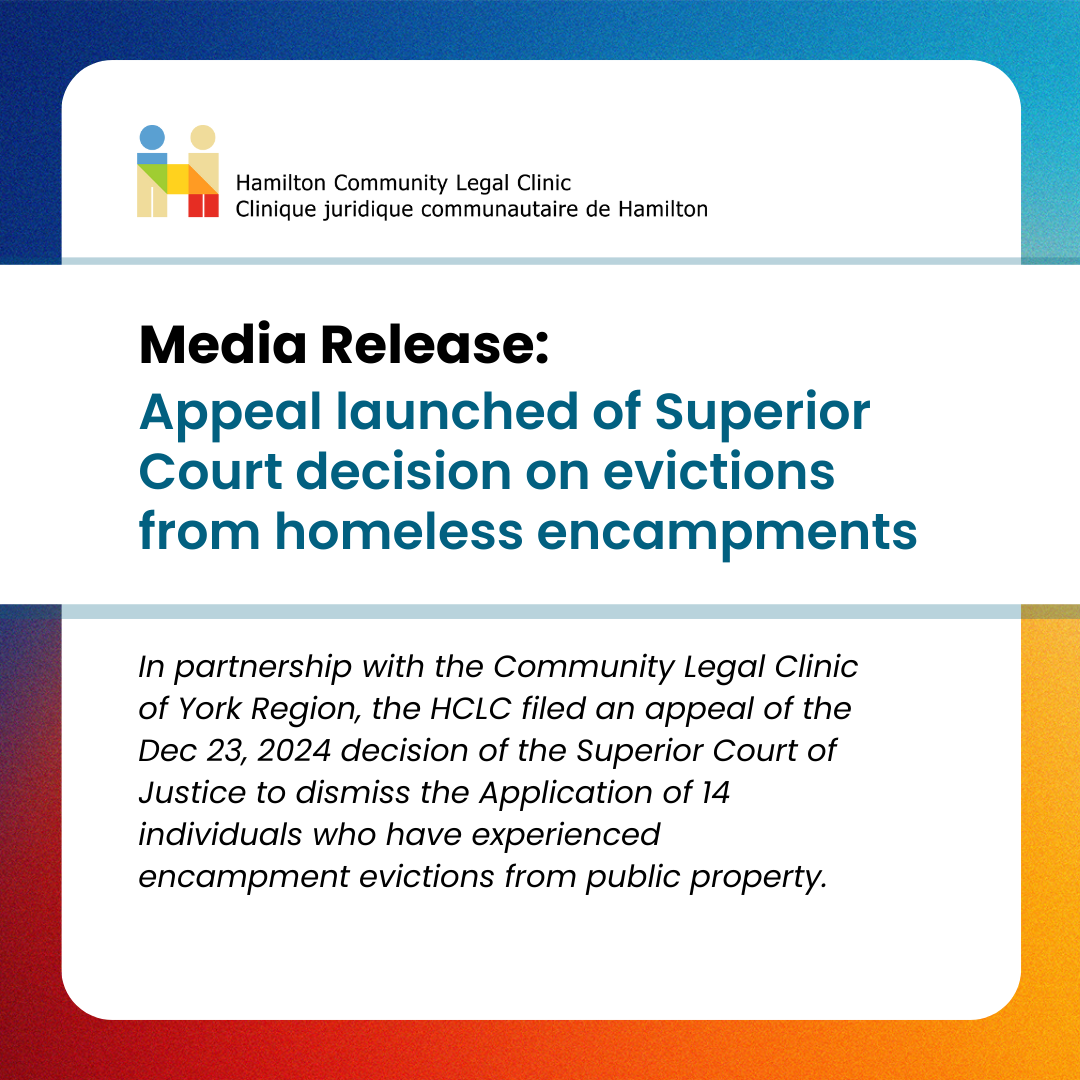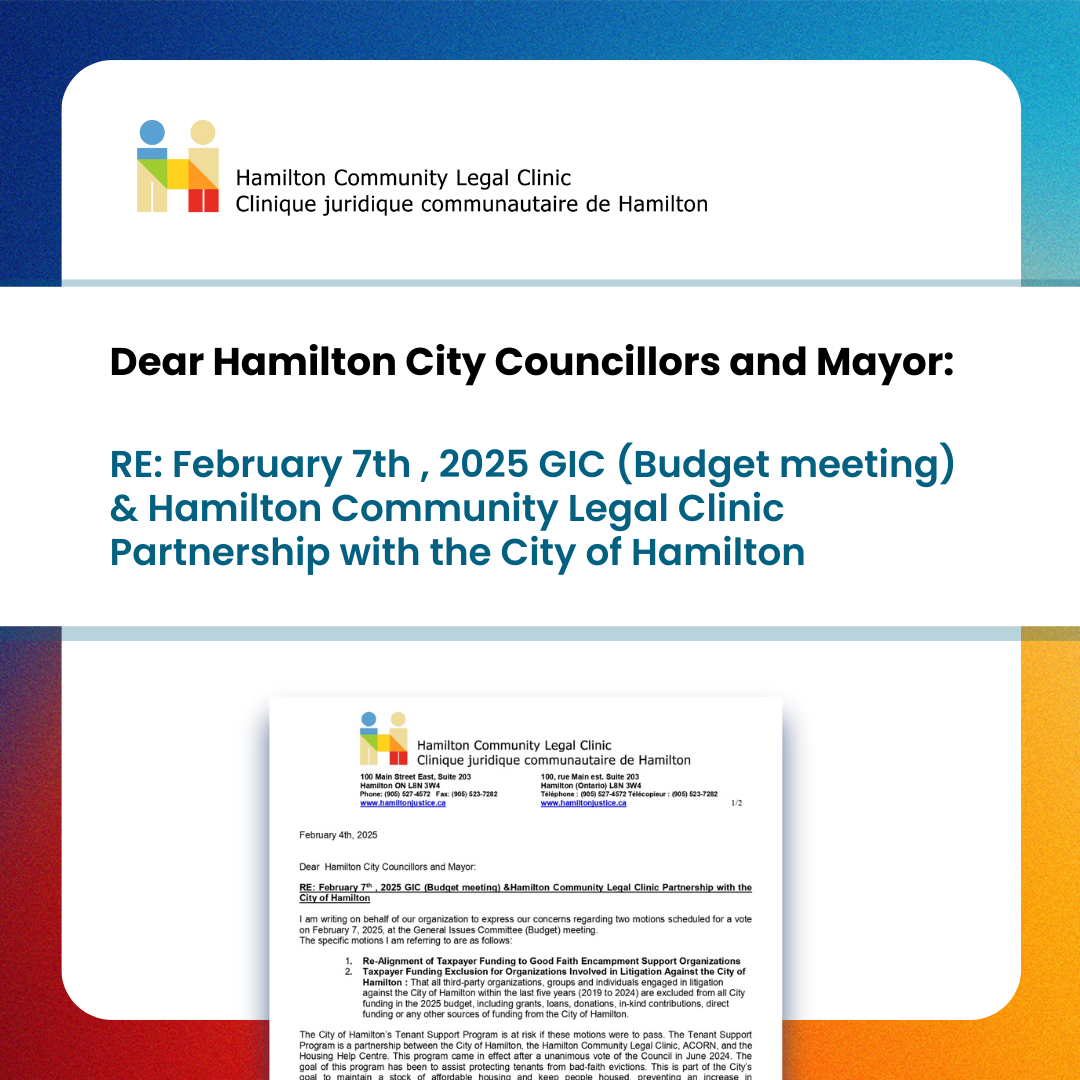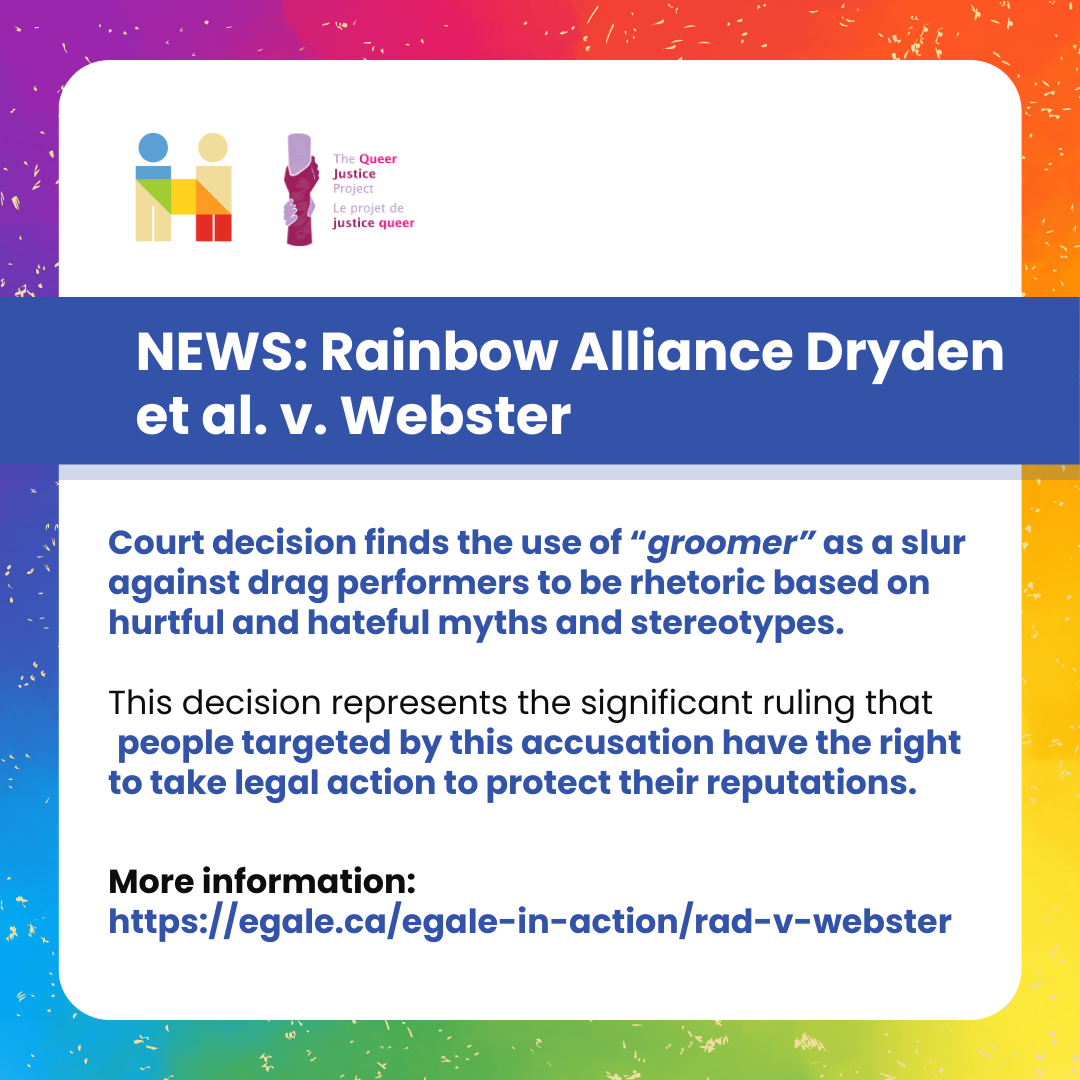
MEDIA RELEASE
March 12, 2025
Public release of Notice of Appeal of Superior Court decision on evictions from homeless encampments
(HAMILTON, March 12, 2025) – The Hamilton Community Legal Clinic, in partnership with the Community Legal Clinic of York Region, is publicly releasing the Notice of Appeal of the Dec. 23, 2024, decision of the Superior Court of Justice to dismiss the Application of 14 individuals who have experienced encampment evictions from public property.
Publicly releasing this information coincides with the Court of Appeal of Ontario officially accepting the Notice of Appeal effective March 10, meaning that the appeal will move forward.
The appeal is filed on behalf of the 14 individuals who have experienced encampment evictions. We maintain that the evictions violated the 14 individuals’ right to life, liberty and security under Section 7 of the Charter of Rights and Freedoms. They further violated the Applicants’ equality rights under Section 15 of the Charter, because the evictions had a disproportionate impact on women, people with disabilities, and Indigenous peoples.
Court decisions play an important role in defining or reforming the legal and constitutional boundaries that address the rights of citizens, including unsheltered and unhoused individuals. When an error in the interpretation of the law is found in a decision, an appeal is the next step, a necessary checkpoint to ensure court decisions uphold the constitutional rights of its citizens.
The full notice of appeal is attached below.

Health Justice Partnerships Coordination and Promotion Project Coordinator
Contract – up to 85 Weeks
Listed on CharityVillage
Join our team! Through an inter-clinic grant by the Law Foundation we are seeking an experienced Health Justice Partnership (HJP) Project Coordinator who would be responsible for meeting the objectives and targets of the grant. There are five inter-related projects which are aimed at strengthening the health justice movement in Ontario and increasing access to justice and health in the province. Each objective will improve the capacity of health and justice sector professionals to develop, deliver, and sustain health justice initiatives. The overall aim is to raise awareness about Health Justice Partnerships in the medical and legal sectors, as well as support existing and prospective HJPs in the province.
Please apply on charityvillage.com no later than Friday, February 26, 2025.

Submitted February 4, 2025 to councillors, the office of the mayor, and city city clerk.
Dear Hamilton City Councillors and Mayor:
RE: February 7, 2025 GIC (Budget) meeting & Hamilton Community Legal Clinic Partnership with the City of Hamilton
I am writing on behalf of our organization to express our concerns regarding two motions scheduled for a vote on February 7, 2025, at the General Issues Committee (Budget) meeting.
The specific motions I am referring to are as follows:
The City of Hamilton’s Tenant Support Program is at risk if these motions were to pass. The Tenant Support Program is a partnership between the City of Hamilton, the Hamilton Community Legal Clinic, ACORN, and the Housing Help Centre. This program came in effect after a unanimous vote of the Council in June 2024. The goal of this program has been to assist protecting tenants from bad-faith evictions. This is part of the City’s goal to maintain a stock of affordable housing and keep people housed, preventing an increase in homelessness.
The Hamilton Community Legal Clinic’s role in this agreement is to provide legal advice and representation to tenants and provide legal education to tenants across the City. In its original agreement with the Hamilton Community Legal Clinic, the City of Hamilton identified that it expected that the Clinic would support 200 tenants per year. The program has been in place for approximately 6 months and has provided legal advice, representation, and support to 236 tenants.
If the intent of these motions are to remove funding from the Hamilton Community Legal Clinic because we were carrying out our mandate and that one of case involved litigation against the City of Hamilton regarding the encampment eviction case this is a concerning reaction. The motions are set to harm the Tenant Support Program which is entirely separate from the encampment litigation. None of the City of Hamilton’s funding is being used for the encampment litigation.
The Hamilton Community Legal Clinic has always been pleased to work with the City of Hamilton, and this program allowed us to provide additional support to tenants in areas of law that we have not previously had the financial capacity to offer. This program provides more services to vulnerable tenants and keeps more people housed.
The Hamilton Community Legal Clinic cannot abandon its core mandate by denying legal support to tenants who wish to challenge government actions. It is a fundamental aspect of our constitution and our democracy that people can challenge and test government action to ensure that governments comply with the Charter of Rights and Freedoms.
While currently aimed at the legal clinic, these motions will have far-reaching consequences that could silence organizations, groups, and individuals, instilling fear and discouraging dissent. This approach jeopardizes community engagement and limits access to justice, ultimately weakening the foundation of collaboration and advocacy that the City of Hamilton and our community relies on.
The Hamilton Community Legal Clinic has served low-income citizens in the areas of housing, injured workers, social assistance, employment and immigration for decades. We have also served our community through public legal education, and community development. We support other community organization in their efforts to keep tenants housed throughout the city. We will continue to do that work even if the City of Hamilton chooses to end this partnership. The impact on the Hamilton Community Legal Clinic will be minimal. The effect on the community of low-income tenants whose housing is threatened will be significant. More tenants will lose their housing and will become homeless.
We urge the Mayor and Councillors to oppose these two motions. It is crucial to allow the Tenant Support Program to continue. Additionally, we must avoid creating a culture of fear and reprisal that would deter community organizations, groups, and individuals from expressing their concerns.
Sincerely,
Clare Freeman, BA, MSW, RSW
Executive Director

(Hamilton, January. 22, 2025) – Yesterday, in partnership with the Community Legal Clinic of York Region, the Hamilton Community Legal Clinic filed an appeal of the Dec. 23, 2024, decision of the Superior Court of Justice to dismiss the Application of 14 individuals who have experienced encampment evictions from public property.
The appeal was filed on behalf of the 14 individuals. We maintain that the evictions violated the 14 individuals’ right to life, liberty and security under Section 7 of the Charter of Rights and Freedoms. They further violated the Applicants’ equality rights under Section 15 of the Charter, because the evictions had a disproportionate impact on women, people with disabilities, and Indigenous peoples.
Our legal team has undertaken a comprehensive review of the Court’s 15-page decision and found there to be many areas of profound concern that warrant an appeal and consideration by the Ontario Court of Appeal. These include the issue of whether individuals were evicted overnight, an adequate analysis of Charter arguments, and the acknowledgement of the disproportionate impact of evictions on women, people with disabilities and Indigenous peoples.
The Hamilton Community Legal Clinic will make the full appeal document open to the public here on our website once the Ontario Court of Appeal provides a copy issued by the Court.
While we cannot comment in detail on the appeal while it is before the Court, it is important to recognize why the appeal was necessary.
Encampments have become an increasingly common sight as communities across Ontario grapple with rising homelessness. The affordable housing crisis, skyrocketing rents, stagnant social assistance rates, and increased cost of living are all putting unprecedented pressures on our communities. Homelessness has become a crisis to which our shelter system cannot keep pace, and shelters have operated at or over capacity for years. The question then becomes: if people can’t afford rent, and the shelters are full, where do they go?
Systemic change and action from all levels of government is needed to address the shortage of affordable housing, the need for supportive and/or transitional housing, mental health and addiction resource gaps, increased shelter capacity and accessible shelter spaces. Encampments in parks are not the solution. How we respond to the issue of homeless encampments is a critical step in creating change that supports everyone in our community.
Court decisions play an important role in that process when they rule on what municipalities can and cannot do to stay within legal and constitutional boundaries to address encampments. When an error is made in that decision, an appeal is the next step, a necessary check point to ensure court decisions are right by law. In this circumstance, it’s a necessary next step in supporting how we address homelessness in our community.
Finding solutions to homeless encampments in our city parks requires compassion and respecting the rights of all – parents and children playing in parks, the housed, and the unhoused. Legal clinics across Ontario are mandated to ensure access to justice for individuals and families living at or below the poverty line, whose circumstances have legal merit to be addressed. Everyone has a right to feel safe; and everyone has a right to a cover over their head in the rain, the snow and the cold.
These 14 individuals also have a right to the appeal process.
We will provide updates as the litigation unfolds, including approximate timelines. We are hopeful that the appeal will be heard in the fall of 2025.

Today is International Overdose Awareness Day (IOAD).
At HCLC, we pause to grieve for the lives lost and to offer compassion to those who continue to struggle. We stand with their loved ones, knowing that each life lost is a profound tragedy that underscores the urgent need for meaningful legal, health and social reform.
“For those who use drugs and those who don’t. For heartbroken friends and family members of lost loved ones. For activists who fight for sorely needed policy reform. For healthcare and harm reduction workers. For tireless advocates. Overdose can affect anyone, and we encourage you to remember the tenacity of our community. Lean into the power that we can have when we work together.” – IOAD Campaign. OverdoseDay.com
The evidence from countries like Portugal, the Netherlands, Switzerland, and others shows that decriminalizing drugs, combined with comprehensive health and social programs, leads to significant reductions in overdose deaths and improvements in public health. In Canada, we face an escalating overdose crisis that demands urgent and innovative solutions.
It is time for Canada to recognize that punitive laws and criminalization are not effective in addressing substance use disorders. It is time for Canada to know the housing affordability crisis, health crisis and systemic inequalities are compounding the Overdose crisis. Instead, Canada’s leaders and communities must focus on a legal public health reform and approaches that prioritizes harm reduction, treatment, and social support. By decriminalizing the possession of drugs for personal use and investing in comprehensive social programs—including access to affordable housing, mental health services, and addiction treatment—Canada can create an environment; like Portugal, the Netherlands and Switzerland, where individuals are supported, not punished.
We call on Canadian policy makers to adopt proven strategies from around the world. By implementing these legal and social reforms, Canada can reduce overdose deaths, improve the lives of those struggling with substance use, and create a more compassionate and effective approach to drug policy. Each life lost is one too many.
For more resources, information, and ideas on how you can support: overdoseday.com/
For more information about HLO: HamiltonJustice.ca/community-justice/mental-health-substance-involved-justice

The Hamilton Community Legal Clinic, along with co-counsel Jen Danch of Swadron Associates, will be representing the family of Attila Csanyi at the upcoming Coroner’s Inquest into his death. The inquest will begin on April 30th, 2024 at 9:30 AM and is expected to continue for two to three weeks. The fourth anniversary of Attila’s passing will fall during the proceedings, on May 2, 2024.
Attila died of a drug overdose on the roof of Jackson Square in Hamilton, Ontario on May 2nd, 2020. Seven weeks before his death Attila was evicted from his home at Sampaguita Lodging & Rest Home, a Residential Care Facility (RCF) on March 11th, 2020. His eviction occurred outside of the process outlined in the Residential Tenancies Act. Following his extra-juridical eviction, Attila was effectively displaced onto the street, and relied on Hamilton’s congregate shelter system at the turn of the 2020 COVID-19 public health crisis.
Proceedings before the Coroner
A coroner’s inquest is an opportunity for members of the public to hear about the circumstances surrounding the death of a community member and neighbour. Outcomes from a coroner’s inquest are determined by a jury, composed of members of the public. In addition to answering the five required questions mandated by the proceeding, the jury may make recommendations to various levels of government, institutions and individuals aimed at preventing future deaths under similar circumstances.
The jury will hear from witnesses for the Hamilton Police Service, City of Hamilton, St. Joseph’s Healthcare Hamilton, and Sampaguita Lodging and Rest Home, in addition to Attila’s brother and father. It is expected that experts in the areas of homelessness, residential care facilities and tenant’s rights will also be called to give evidence.
Anticipated Evidence and Recommendations Attila’s family will be seeking
We anticipate that this inquest will draw attention to the institutional failings that created the conditions for the destabilization of Attila’s housing and supportive care in the weeks prior to his death. The jury will hear evidence about the history of RCFs’ operations, oversight and funding structures; the unique vulnerabilities of residents living within care homes; and the role of community organizations and support workers in the overall care and wellbeing of RCF tenants. Ultimately, once all of the evidence is heard, the jury may make recommendations aimed at preventing future deaths of individuals in similar situations.
Having spent a significant amount of time reviewing the evidence yielded through the investigation into Attila’s death and the historical, social location of Residential Care Facilities within the current housing and health care landscape, counsel for Attila’s family anticipates recommendations may flow from and be aimed at:
Link to View the Inquest
To access the livestream for the inquest, please use this link:
https://firstclassfacilitation.ca/office-of-the-chief-coroner/inquest-into-the-death-of-Attila-Csanyi/
Media inquiries
At this time, we will be responding to media inquiries in writing. Please direct inquiries to the attention of “Counsel for the Family – Csanyi Inquest” at general@hamiltonjustice.ca

If your landlord is not a resident of Canada, the tenant has to pay 25% of the rent to the CRA. If they don’t, and if the landlord does not pay the required taxes, the tenant can be held liable with all of the interest and penalties.
Source: Foreign landlord fails to pay taxes, CRA goes after tenant. (Kerry Gold, The Globe and Mail Published April 12, 2024) https://www.theglobeandmail.com/real-estate/vancouver/article-foreign-landlord-fails-to-pay-taxes-cra-goes-after-tenant
The Hamilton Community Legal Clinic is deeply troubled by this decision. Shifting the burden of tax-collection onto renters demonstrates a stunning disregard for the protection of and well-being on Canadian tenants. The idea that a residential tenant ought to be in a position to determine their landlord’s tax obligations, if the landlord has met their tax obligations and then withhold rent accordingly, demonstrates a clear disconnection between the people writing and interpreting our laws and the real world in which Canadians live. We urge the Federal Government to quickly act to address this clear injustice.

On December 14, 2023, the Ontario Superior Court of Justice decided in Rainbow Alliance Dryden et al. v. Webster to allow a defamation suit by a drag performer and a 2SLGBTQI community organization against an individual who publicly called them “groomers” to continue to trial.
In doing so, the court initially ruled that there is no public interest in protecting baseless accusations of child sexual abuse against 2SLGBTQI people.
The court then relied on Egale Canada’s intervention to affirm the exact opposite: Because false accusations of pedophilia have been weaponized against 2SLGBTQI people to deny members of our communities equal rights and opportunities for decades, the law must allow people being targeted by these homophobic and transphobic myths to pursue defamation claims.
In recent years, drag performers putting on family-friendly shows have been increasingly targeted with the baseless accusation that they are grooming children for sexual abuse. The correct use of the word “grooming” refers to practices by which sexual abusers gain access to victims, usually children and youth, and coerce and manipulate them to facilitate sexual abuse.
Drag performances are a form of cultural expression and the equation of drag performances to child grooming is based on the homophobic and transphobic belief that gender diversity is inherently dangerous to children. The court accepted that the term “groomer” has come to function as a slur against drag performers and 2SLGBTQI people more broadly.
The court’s decision finds the use of the “groomer” slur against drag performers to be rhetoric based on hurtful and hateful myths and stereotypes
This is an important decision for 2SLGBTQI communities that comes at a time when we are facing unprecedented levels of hate, harassment, and violence fuelled by the spread of misinformation and disinformation. As noted in the court’s decision, the term “groomer” is a slur used against drag performers that is “rhetoric based on hurtful, and hateful myths and stereotypes…”
This decision represents the significant finding that calling drag performers “groomers” is an accusation of child sexual abuse and that people targeted by that accusation have the right to take legal action to protect their reputations.
Credits and Source: Egale Canada
https://egale.ca/egale-in-action/rad-v-webster

Tribunal ruled that the Workplace Safety Insurance Board (WSIB) has been illegally reducing compensation of racialized injured migrant workers for decades.
Last week, the Workplace Safety and Insurance Appeals Tribunal ruled that the Workplace Safety Insurance Board (WSIB) has been illegally reducing compensation of racialized injured migrant workers for decades. In an extensive ruling that took official notice of the institutional racism that migrant farm workers face, the Tribunal determined that the WSIB’s practice of ending compensation to migrant farm workers was illegal, and reinstated Loss of Earnings compensation to a group of four permanently injured migrant workers from Jamaica.
The ruling stems from a WSIB practice that reduces partially injured migrant workers’ Loss of Earnings benefits after 12 weeks by pretending they can earn income from suitable work in Ontario even though such work is not available to injured migrants.
Leroy Thomas is one of the appellants. As a participant on the Seasonal Agricultural Workers Program (SAWP), Thomas left his young family in Jamaica to work the fields in Ontario for up to 8 months a year.
In 2017, he suffered a permanent back injury that ended his 16 year career in Ontario. The WSIB knew that Thomas could not come back to work in Ontario with his injury, but cut his benefits as if he could. It told Thomas that, if he could still work in Ontario, he could restore his income with his disability by getting a job as a parking lot attendant. It ended his Loss of Earnings compensation shortly after his injury as if he was working that job. The WSIB’s practice forced Thomas, and injured migrant workers like him, into poverty with no realistic way of restoring their income in Jamaica with their injuries. Thomas started to organize with Justice for Migrant Workers and Injured Workers Action for Justice to press the WSIB for changes. He also appealed his case with three other injured migrant workers. In their landmark decision, the Tribunal said that WSIB must provide meaningful retraining and/or compensation based on the individual circumstances and labour market realities that migrant workers face in their home countries. In doing so, it determined that migrant workers are entitled to the same.

Public Health is directed by the Ministry of Health to monitor food affordability. This is achieved by conducting a survey of food costs in a sample of Hamilton grocery stores using a tool called the Ontario Nutritious Food Basket (ONFB). Food costing was conducted in Hamilton in May 2023.
Results from 2023 have been posted on the City of Hamilton’s web page, Monitoring Affordability in Hamilton: https://www.hamilton.ca/people-programs/public-health/healthy-eating/monitoring-food-affordability-hamilton.
To monitor food affordability, monthly costs of food plus the average cost of market rental housing in Hamilton are compared to incomes for eight individual and family scenarios. The family/individual income scenarios can be downloaded by clicking on this document: Household scenarios comparing income to monthly expenses in Hamilton.
The methodology used for surveying food costs in Hamilton in 2022 was repeated in 2023 and therefore results are comparable. The cost of the ONFB in Hamilton for a reference family of four (2 adults and 2 school-aged children) rose from $1031/month in 2022 to $1110/month in 2023, representing an increase of approximately 8%.
–
With the rising costs of food and rental prices, the HCLC will continue to, and encourages other individuals, organizations and stakeholders to empower our communities; especially those whose identities intersect with racial, gendered, sexual, disabled, and many other lines.